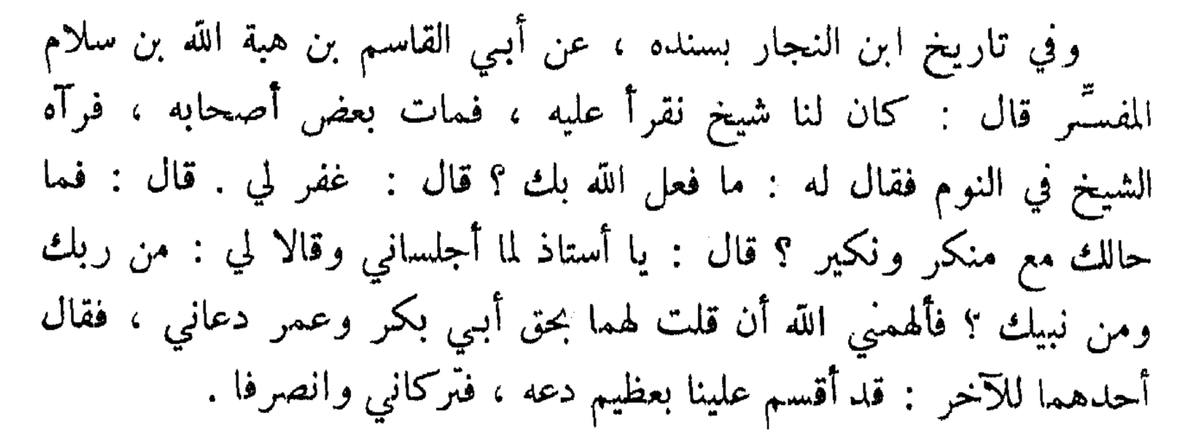
.:Raising the hands only at commencement:.
Said Ábdullāh ibn Masúūd:
“Shall I not pray for you the prayer of RasūlAllāh ﷺ?”
Thus, he prayed and did not raise his hands except for the first time.
Abū Ýīsā [al-Tirmidhī] said:
“The ĥadīth of Ibn Masúūd is a ĥasan ĥadīth.
Said Ábdullāh ibn Masúūd:
“Shall I not pray for you the prayer of RasūlAllāh ﷺ?”
Thus, he prayed and did not raise his hands except for the first time.
Abū Ýīsā [al-Tirmidhī] said:
“The ĥadīth of Ibn Masúūd is a ĥasan ĥadīth.

More than one amongst the people of knowledge from the companions of Nabī ﷺ and the tābiýīn held this opinion, and it is the opinion of Sufyān al-Thawrī and the people of Kūfah.”
[Tirmidhī, #257]
Albānī grades this narration şaĥīĥ.
[Tirmidhī, #257]
Albānī grades this narration şaĥīĥ.

He also graded the same ĥadith şaĥīĥ in Mishkāt al-Maşābīĥ:
“The reality is that it is a şaĥīĥ ĥadith, and its isnād is şaĥīĥ upon the criteria of Muslim.”
[Mishkāt al-Maşābīĥ, pg. 254]
“The reality is that it is a şaĥīĥ ĥadith, and its isnād is şaĥīĥ upon the criteria of Muslim.”
[Mishkāt al-Maşābīĥ, pg. 254]

Sayyidunā Ábdullāh ibn Masúūd, may Allāh be pleased with him, is the most knowledgable of companions in fiqh after the four caliphs.
RasūlAllāh ﷺ said regarding him:
“Accept that which is narrated to you by Ibn Masúūd.”
[Tirmidhī, who grades it ĥasan]
RasūlAllāh ﷺ said regarding him:
“Accept that which is narrated to you by Ibn Masúūd.”
[Tirmidhī, who grades it ĥasan]

Regarding his close relationship with RasūlAllāh ﷺ, it was reported by Abū Mūsā al-Ashárī, may Allāh be pleased with him:
“I and my brother arrived from Yemen, and we did not see a time except that we thought Ábdullāh ibn Masúūd is a man from the Ahl al-Bayt of Nabī ﷺ,
“I and my brother arrived from Yemen, and we did not see a time except that we thought Ábdullāh ibn Masúūd is a man from the Ahl al-Bayt of Nabī ﷺ,

due to what we observed of his entering and his mother's entering upon Nabī ﷺ.”
[Tirmidhī, who graded it ĥasan şaĥīĥ]
Albānī also grades it şaĥīĥ in Şaĥīĥ Sunan al-Tirmidhī, 3/551.
[Tirmidhī, who graded it ĥasan şaĥīĥ]
Albānī also grades it şaĥīĥ in Şaĥīĥ Sunan al-Tirmidhī, 3/551.

Regarding his closeness to RasūlAllāh ﷺ in guidance and conduct, it is narrated from Ábd al-Raĥmān ibn Yazīd:
“We came to Ĥudhayfah [ibn al-Yamān] and we said unto him, ‘Inform us who is the closest of people to RasūlAllāh ﷺ in guidance and conduct,
“We came to Ĥudhayfah [ibn al-Yamān] and we said unto him, ‘Inform us who is the closest of people to RasūlAllāh ﷺ in guidance and conduct,
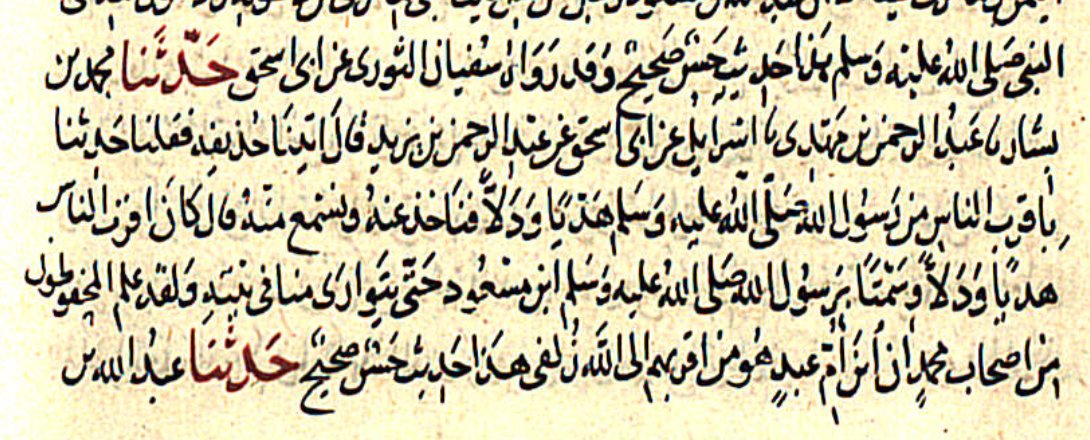
that we may take from him and hear from him.’
He said, ‘The closest of the people in guidance, conduct, and character was Ibn Masúūd, until he would hide from us in his house.
He said, ‘The closest of the people in guidance, conduct, and character was Ibn Masúūd, until he would hide from us in his house.
Indeed, the guarded ones among the companions of Muhammad [ﷺ] know that Ibn Umm Ábd [Ábdullāh ibn Masúūd] is from among the most intimately close to Allāh of them.’”
[Tirmidhī, who graded it ĥasan şaĥīĥ]
Albānī also grades it şaĥīĥ in Şaĥīĥ Sunan al-Tirmidhī, 3/552.

[Tirmidhī, who graded it ĥasan şaĥīĥ]
Albānī also grades it şaĥīĥ in Şaĥīĥ Sunan al-Tirmidhī, 3/552.
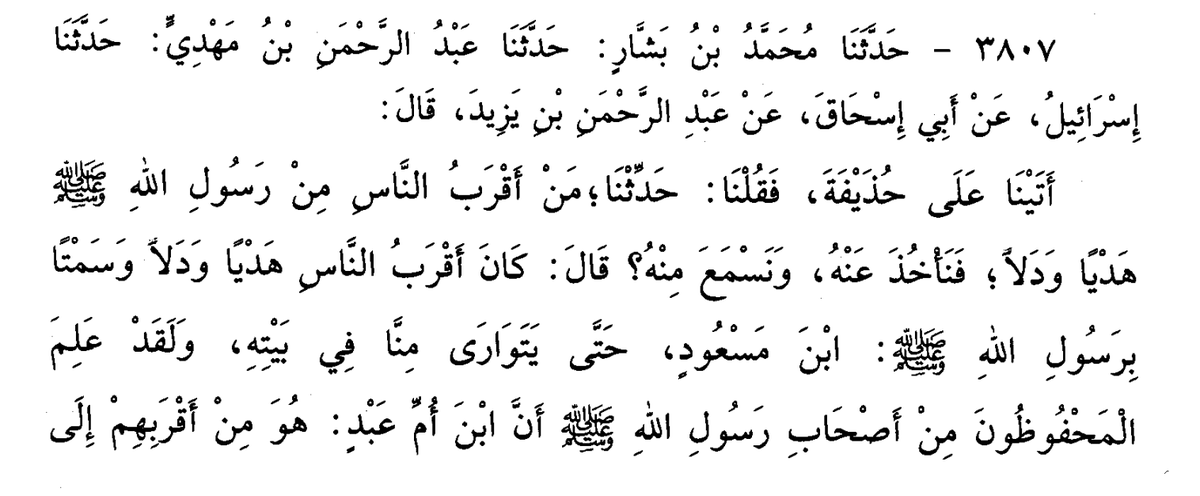

In short, there are many virtues of this noble companion that have been authentically narrated, and below is a brief summary of his status and rank among the companions, especially in his knowledge of fiqh.
May Allāh be pleased with him and forgive us for his sake.
May Allāh be pleased with him and forgive us for his sake.

The students of Sayyidunā Ábdullāh ibn Masúūd also narrated this from him.
Imām Abū Ĥanīfah narrates from Ĥammād, who narrates from Ibrāhīm, who narrates from Aswad:
“Ábdullāh ibn Masúūd, may Allāh be pleased with him, would raise his hands at the first takbīr.
Imām Abū Ĥanīfah narrates from Ĥammād, who narrates from Ibrāhīm, who narrates from Aswad:
“Ábdullāh ibn Masúūd, may Allāh be pleased with him, would raise his hands at the first takbīr.

Then he would not return to that, and he would relate this from RasūlAllāh ﷺ.”
[Jāmiy Masānīd Abū Ĥanīfah, 1/255, and Musnad Abū Ĥanīfah, 147]
It is narrated from Sufyān ibn Úyaynah, he said:
“Abū Ĥanīfah and Awzāýī met at the wheat-sellers' market in Makkah.

[Jāmiy Masānīd Abū Ĥanīfah, 1/255, and Musnad Abū Ĥanīfah, 147]
It is narrated from Sufyān ibn Úyaynah, he said:
“Abū Ĥanīfah and Awzāýī met at the wheat-sellers' market in Makkah.
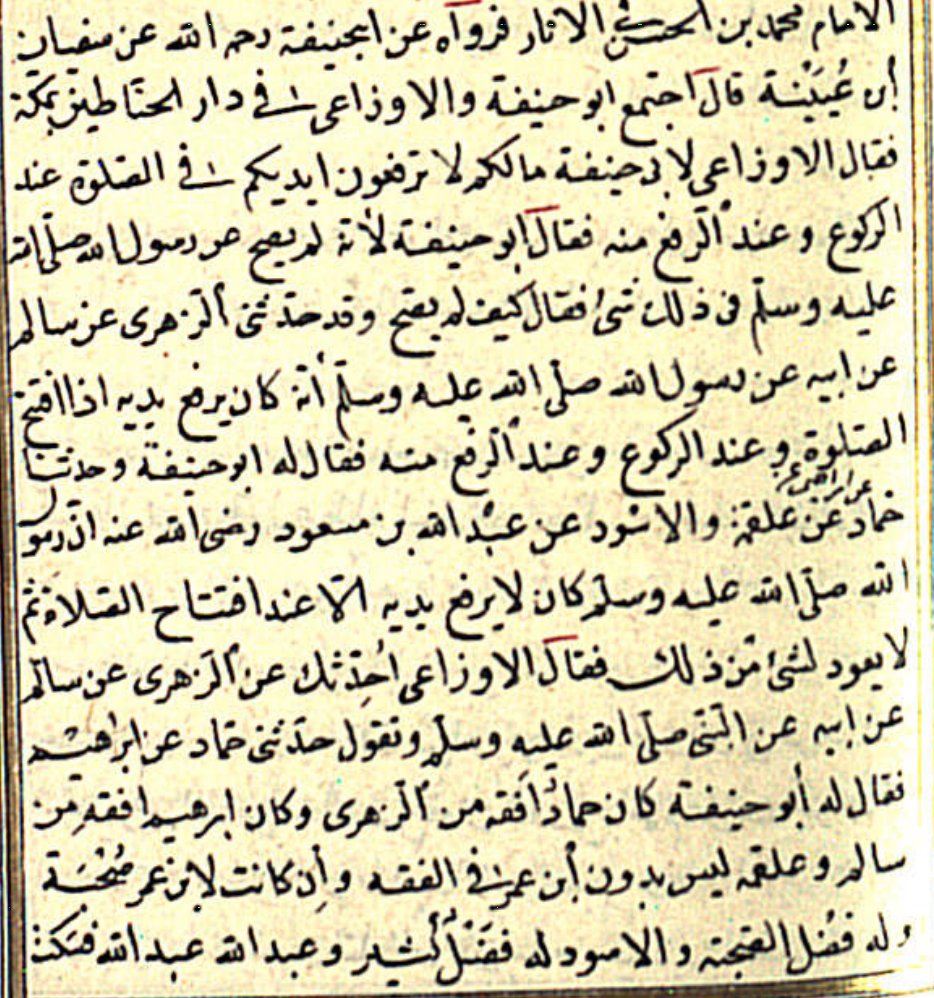

Said Awzāýī to Abū Ĥanīfah, ‘What is wrong with you people? You do not raise your hands during prayer when bowing and when rising from it.’
Said Abū Ĥanīfah, ‘That is because nothing authentic has been reported from RasūlAllāh ﷺ regarding that.’
Said Abū Ĥanīfah, ‘That is because nothing authentic has been reported from RasūlAllāh ﷺ regarding that.’
He said, ‘How has there not been anything authentic, when indeed Zuhrī has narrated to me from Sālim, from his father, that RasūlAllāh ﷺ would raise his hands when commencing the prayer, and when bowing, and when rising from it.’
Abū Ĥanīfah said unto him, ‘Ĥammād narrated to us from Ibrāhīm, from Álqamah and Aswad, from Ábdullāh ibn Masúūd, may Allāh be pleased with him, that RasūlAllāh ﷺ would not raise his hands except when commencing the prayer, then he would not return to that.’
Said Awzāýī, ‘I narrate to you from Zuhrī, from Sālim, from his father, from Nabī ﷺ, and you say, “Ĥammād narrated to me from Ibrāhīm?”’
Abū Ĥanīfah said unto him, ‘Ĥammād was greater in fiqh than Zuhrī, and Ibrāhīm was greater in fiqh than Sālim,
Abū Ĥanīfah said unto him, ‘Ĥammād was greater in fiqh than Zuhrī, and Ibrāhīm was greater in fiqh than Sālim,
and Álqamah was not less than Ibn Úmar in fiqh, even though Ibn Úmar had companionship, and he has the virtue of companionship, and Aswad has great virtue, and Ábdullāh is Ábdullāh.’
Thus, Awzāýī fell silent.”
[Jāmiy Masānīd Abū Ĥanīfah, 1/352-353]
Thus, Awzāýī fell silent.”
[Jāmiy Masānīd Abū Ĥanīfah, 1/352-353]
In the first narration we saw Imām Álqamah narrated this from Sayyidunā Ábdullāh ibn Masúūd, and in the second narration we saw Imām Aswad narrated this from him.
In the third narration we saw this was narrated by both of them.
Let us now turn our attention to these two.
In the third narration we saw this was narrated by both of them.
Let us now turn our attention to these two.
Imām Álqamah and Imām Aswad were both great scholars from among the tābiýīn, and were the most excellent of the students of Sayyidunā Ábdullāh ibn Masúūd. Not only did they hear him narrate this from RasūlAllāh ﷺ but also witnessed him pray in this manner. 

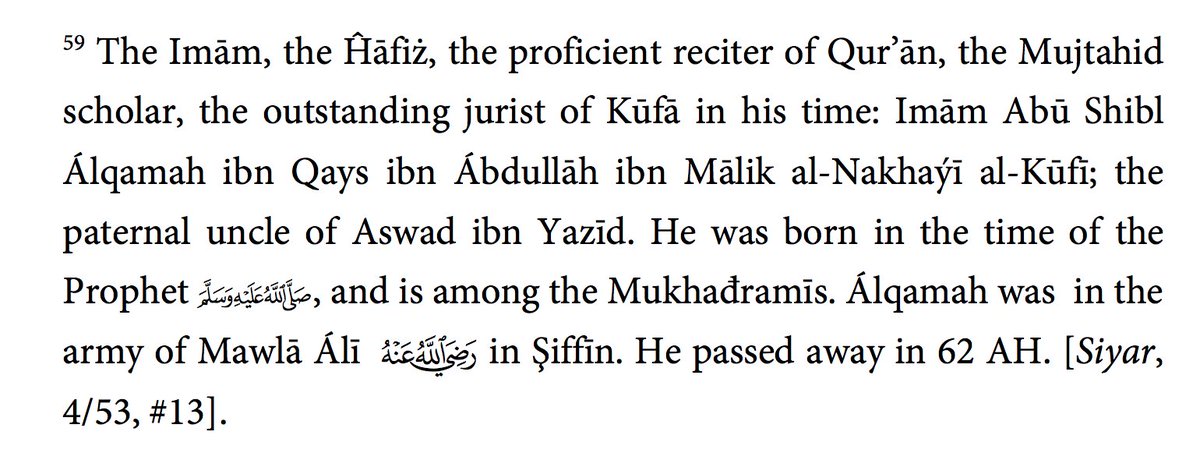

The most knowledgable student of the twain, Imām Álqamah and Imām Aswad, was Ibrāhīm al-Nakhāýī. He too was a great scholar from among the Salaf, and it can be seen that some of the narrations regarding this were narrated via him. 

Imām Abū Ĥanīfah narrates from Ĥammād, who narrates from Ibrāhīm:
“Do not raise your hands at all during your prayer, after the first instance.”
Muĥammad ibn al-Ĥasan [al-Shaybānī] recorded it in Āthār.
“Do not raise your hands at all during your prayer, after the first instance.”
Muĥammad ibn al-Ĥasan [al-Shaybānī] recorded it in Āthār.

He narrated it from Abū Ĥanīfah and then Muĥammad said, “We take this, and it is the opinion of Abū Ĥanīfah, may Allāh have mercy upon him.”
[Jāmiý Masānīd Abū Ĥanīfah, 1/353]
[Jāmiý Masānīd Abū Ĥanīfah, 1/353]
Imām Abū Ĥanīfah narrates from Ĥammād, who narrates from Ibrāhīm, that the narration of Wā’il ibn Ĥujr was mentioned before him, that he saw Nabī ﷺ raising his hands when bowing and when prostrating, thus he said:
“Wā’il was a bedouin, he did not know the rulings of Islām.
“Wā’il was a bedouin, he did not know the rulings of Islām.

He did not pray with Nabī ﷺ, except for a single prayer. Indeed, countless people have narrated to me from Ábdullāh ibn Masúūd that he would only raise his hands at the commencement of prayer, and he reported that from Nabī ﷺ,
and Ábdullāh was knowledgable in the rulings of Islām and its boundaries. He inspected the states of RasūlAllāh ﷺ, and would stick with him in his residence and in his travelling, and indeed he prayed with Nabī ﷺ on countless instances.”
[Jāmiý Masānīd Abū Ĥanīfah, 1/358]
[Jāmiý Masānīd Abū Ĥanīfah, 1/358]
Imām Abū Jaáfar al-Ţaĥāwī al-Ĥanafī [239-321 AH / 843-933 CE] writes:
Narrated to us Abu Bakrah, he said narrated to us Muammal, he said narrated to us Sufyān, from Mughīrah who said:
“I said unto Ibrāhīm the narration of Wā’il,

Narrated to us Abu Bakrah, he said narrated to us Muammal, he said narrated to us Sufyān, from Mughīrah who said:
“I said unto Ibrāhīm the narration of Wā’il,


that he saw Nabī ﷺ raising his hands when he commenced prayer, and when he bowed, and when he raised his head from bowing.
He said, ‘If Wā’il saw him raising his hands at one instance, then indeed Ábdullāh [ibn Masúūd] saw him not doing that on 50 instances.’”
He said, ‘If Wā’il saw him raising his hands at one instance, then indeed Ábdullāh [ibn Masúūd] saw him not doing that on 50 instances.’”
[Sharĥ Máānī al-Āthār, 1/244]
The most knowledgeable student of Imām Ibrāhīm al-Nakhaýī was Imām Ĥammād ibn Abi Sulaymān, who reported these narrations to his student Imām al-Aáżam Abū Ĥanīfah, and witnessed him praying in this manner.
The most knowledgeable student of Imām Ibrāhīm al-Nakhaýī was Imām Ĥammād ibn Abi Sulaymān, who reported these narrations to his student Imām al-Aáżam Abū Ĥanīfah, and witnessed him praying in this manner.

Indeed, Imām al-Aáżam Abū Ĥanīfah was not ignorant of the narrations in which raising the hands during the prayer were mentioned, but rather he based his ruling on the practice and many reports which were transmitted from his teachers back to Sayyidunā Ábdullāh ibn Masúūd. 

This chain of transmission is the chain of transmission of fiqh from RasūlAllāh ﷺ to Imām al-Aáżam. This was passed down in both word and action, along with many other rulings. 



• • •
Missing some Tweet in this thread? You can try to
force a refresh











